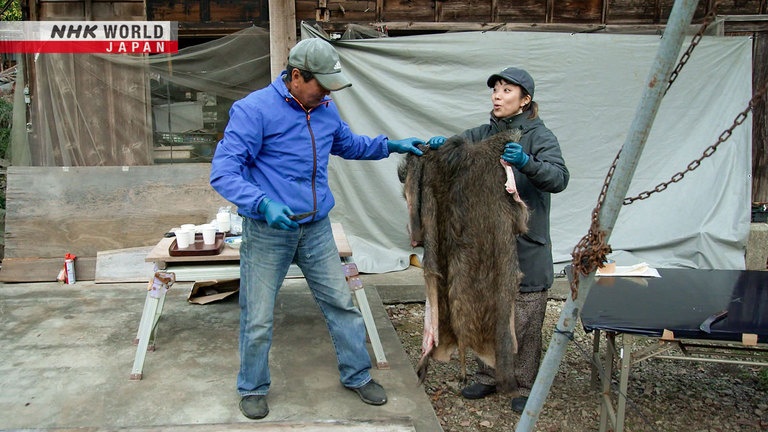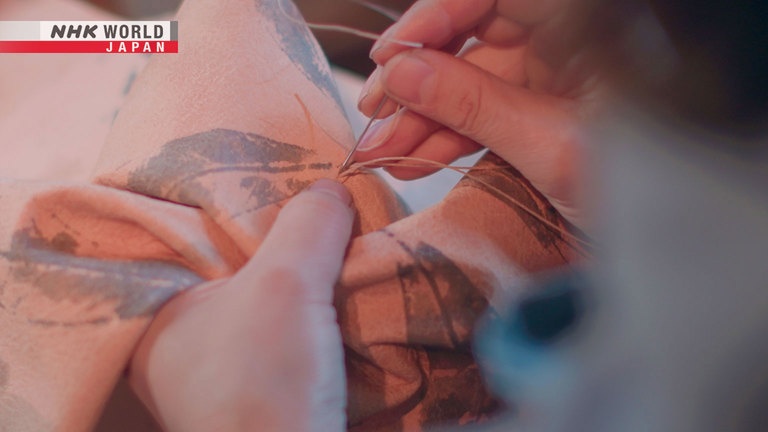Life of the Mountain
Artisan Takezawa Mutsumi's workshop lies at the foot of a mountain west of Tokyo. She makes pieces using leather from animals culled as pests, hides usually thrown away, but she gives them new life.




Transcript
Since ancient times, the Japanese have believed that a life force resides in all creations.
Valuing and caring for the things we use, a "Zero Waste Life."
Pointing the way to better living for a new era.
On the western edge of Tokyo, a quiet village surrounded by mountains.
At the forest's entrance, stands a single workshop.
It belongs to Takezawa Mutsumi.
A handicraft artisan, she's been based here for nearly ten years.
She makes pieces with materials like metal and leather, featuring mountain and nature motifs.
These are ear cuffs with a grass motif.
This has branch forms on it.
Things I see when out walking.
I think, "oh, that's nice," and
things like this are the result.
Just what I see,
if it has the right shape.
Three years ago, Takezawa began a new project.
And today, she's come to the home of a hunter who lives in a nearby town.
It's huge!
A freshly caught boar.
Takezawa uses the hides of such animals for her work.
In these mountain villages, wild animals cause serious damage to farmer's fields.
Which is why local hunters work to reduce their numbers during the autumn and winter months.
It's an essential part of coexisting with nature.
Koyama Harehiko is a 25-year veteran hunter.
Although the meat can be eaten by the hunters, until now, the hides had no use, and had to be discarded.
Out of respect for the life we've taken,
we should use everything we can.
They turned to Takezawa, who now uses the hides in her work and returns a portion of the proceeds to the hunters.
It's heavy!
It was once the back of an animal.
When I sell what I make, I want it to
tell the story of where it came from.
Koyama himself is a fan of her work.
A durable phone pouch made with hide from deer and boar that Koyama caught himself.
It's a great work partner.
As the morning sun touches the wintery mountains, Takezawa's day begins.
The morning's first task is on the mountain.
She collects dry fallen branches as fuel for her stove.
Just doing this warms me up.
Almost no need to light the stove.
As the workshop warms up, it's on to the next task.
There's no plumbing, so she takes the water she needs from a mountain stream.
She also washes the vegetables for her lunch.
I'm hot!
Today, Takezawa will be working with leather.
The hide of a deer that was caught and tanned the previous year.
It's pretty rough leather.
Characteristic of wild animals, the skins have many blemishes and scars.
No two are ever alike.
Marks like these are proof
it was a living thing.
I once saw a herd of wild deer.
About 20 of them.
I just watched them pass by.
A living animal is something
completely different.
Seeing that, I tried to preserve the form.
Every bit of it.
First, she gathers the materials for dyeing the leather; collecting leaves from a nearby loquat tree.
The cut leaves are steeped in boiling water for at least two hours.
While she waits, she prepares lunch.
Wood from the mountain makes the fire.
Being able to use that to make food
is something truly wonderful.
Nothing goes to waste. It's warm,
and it provides me with lunch.
The loquat leaf dye is now ready.
She applies the dye to gathered leaves to create a pattern.
The leather is then left to dry for several days.
Her life and work here in the mountains had its beginnings some 20 years ago.
After graduation from a trade school, Takezawa traveled around Asia as a backpacker.
She was deeply moved by what she saw on her travels.
I saw things like handmade paper
hung up to dry with the laundry.
It was striking to see making things
as a part of daily life.
It was amazing, just perfect.
A place to make things with what's at hand.
She would find such a place 10 years later, when she acquired her mountain workshop.
I felt a strong sense of meaning,
and connection with nature.
And I wanted to live and create here.
It seems to work somehow.
The dried leather now has a vivid pattern.
She'll be making a large drawstring bag.
The pattern makes it tricky.
Oh, I've got it!
Like this... and this, so there's as little
waste as possible. Right to the edge.
Oh, wow! Look!
The ginkgo leaves...
It's cut. Cute.
Let's do the bottom with no pattern.
This is the toughest part.
It's the hide from the back.
All the people here making one thing,
all together; it has real meaning.
Meeting the hunters totally changed
the way that I make things.
It's finished.
Nice, right?
A one-of-a-kind piece born of the mountain's bounty.
She plans to sell it for around $250 US dollars at her next exhibition.
Hello!
In the evening, she joins the hunters for a party.
Cheers!
On the menu, grilled deer and boar meat they caught themselves, as well as boar miso soup.
It's Takezawa's first time eating local wild game.
Delicious! And so tender!
Delicious!
I brought my latest leather piece.
I want to make one for my daughter.
She also brought a special present made with both deer and boar leather.
I think the animals will be pleased.
I saw it being butchered and now
I'm enjoying the meat with all of you.
Today, the whole thing has
truly come full-circle.